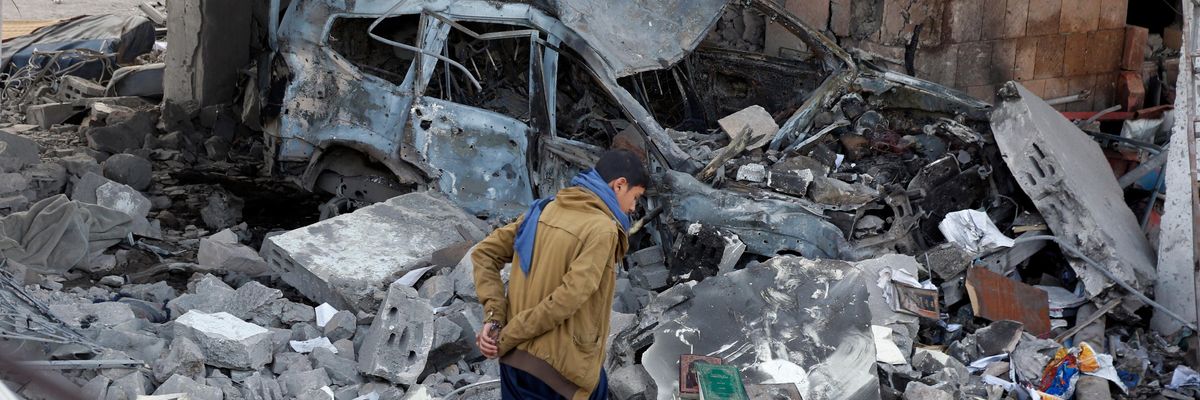As President Joe Biden prepares to visit Saudi Arabia this week, peace and human rights campaigners on Monday decried a report that his administration is considering lifting its amorphous ban on the sale of "offensive" U.S. weaponry to the repressive monarchy.
"Biden is considering resuming offensive weapon sales to one of the most brutal dictators on the planet: Saudi Arabia's Crown Prince MBS."
According to Reuters, the U.S. administration has come under pressure from Saudi officials to end its policy of selling only defensive arms to the kingdom, which Biden is scheduled to visit later this week as part of a wider Middle East tour with stops in Israel and the illegally occupied West Bank of Palestine.
"Biden is headed to Israel and Saudi Arabia this week, where he will sing the praises of an apartheid government and a council of oil dictators," tweeted Sunjeev Bery, executive director of Freedom Forward, which seeks to end U.S. support for dictatorships.
"And now, Biden is considering resuming offensive weapon sales to one of the most brutal dictators on the planet: Saudi Arabia's Crown Prince MBS," he added, a reference to de facto Saudi ruler Mohammed bin Salman.
Jasmine Krotkov, a Democratic candidate for the Montana House of Representatives, tweeted that "Saudi Arabia and the UAE are fabulously wealthy oil states and do not need any aid from the U.S."
"U.S. weapons transfers are intended to throw our money to American arms corporations," she added.
People familiar with the matter told Reuters that any final decision on a Biden administration arms policy shift depends upon whether the Saudis make progress toward ending the war in neighboring Yemen:
The internal U.S. deliberations are informal and at an early stage, with no decision imminent, two sources said, and a U.S. official told Reuters there were no discussions on offensive weapons under way with the Saudis "at this time."
But as Biden prepares for a diplomatically sensitive trip, he has signaled that he is looking to reset strained relations with Saudi Arabia at a time when he wants increased Gulf oil supplies along with closer Arab security ties with Israel to counter Iran.
A week after taking office in January 2021, Biden--who while campaigning for president vowed to make Saudi Arabia a "pariah"--temporarily froze arms sales to the kingdom and the United Arab Emirates pending a review of weapons deals with repressive regimes approved during the presidency of Donald Trump. The following month, the president announced his administration would end U.S. support for "offensive operations" in the Saudi-led war on Yemen.
However, Biden was accused of breaking his promise following his administration's approval of a $500 million maintenance and support services contract for Saudi military helicopters and a $650 million air-to-air missile sale to the Royal Saudi Air Force, whose airstrikes have killed thousands of civilians.
As Juan Cole notes at Informed Comment:
Since Saudi Arabia, the United Arab Emirates (UAE), and their allies launched a war on Yemen in 2015, some quarter of a million people have been killed (most by disease and hunger caused by the war), and half the population has been made food insecure. Of those killed in air strikes, about 17,000 are known to have been civilian non-combatants, according to the U.N.
In late January of this year alone, Saudi and UAE fighter-jets, supplied by the U.S., hit three primarily civilian sites, including a hospital and a Houthi a telecommunications corporation. The strikes killed 80 civilians and caused 156 injuries. And that was just one two-week period.
Last month, the U.S. Government Accountability Office (GAO) published a report acknowledging difficulties in determining whether Saudi forces are using U.S.-supplied weapons in a "defensive" manner.
Jason Bair, GAO's director of international affairs and trade, told the Washington Post that while U.S. State Department officials "told us that they attempt to distinguish between 'offensive' and 'defensive' weapons, they have no specific definitions of 'offensive' and 'defensive.'"
"Without clear definitions of 'offensive' and 'defensive' weapons, it can be difficult for the State Department to implement the president's wishes" to end offensive arms sales, Bair noted, adding that "State's assessment is based on the intended use of the weapons, which may or may not match the actual use."
Biden is defending his renewed engagement with the Saudis.
In an opinion piece published Saturday in the Washington Post, the president acknowledged that "there are many who disagree with my decision to travel to Saudi Arabia" before explaining why he is seeking closer engagement with one of the most repressive governments on the planet and the perpetrator of what has been widely called the world's worst humanitarian crisis in Yemen.
"As president, it is my job to keep our country strong and secure. We have to counter Russia's aggression, put ourselves in the best possible position to outcompete China, and work for greater stability in a consequential region of the world," Biden wrote.
"To do these things, we have to engage directly with countries that can impact those outcomes," he explained. "Saudi Arabia is one of them, and when I meet with Saudi leaders on Friday, my aim will be to strengthen a strategic partnership going forward that's based on mutual interests and responsibilities, while also holding true to fundamental American values."
Since the end of World War II, the United States has supported most right-wing dictatorships around the world in service of U.S. government and business interests.
Biden's op-ed points to U.S. sanctions imposed on members of the elite Saudi "Tiger Squad" involved in the grisly October 2018 murder of journalist Jamal Khashoggi, as well as visa bans targeting scores of Saudis "involved in harassing dissidents."
However, the piece does not mention bin Salman, who according to American intelligence agencies ordered the murder of Khashoggi--a legal U.S. resident--with no punitive action by the Biden administration. Nor does it mention Saudi Arabia's abysmal human rights record or alleged involvement in the September 11, 2001 al-Qaeda attacks on the United States.

